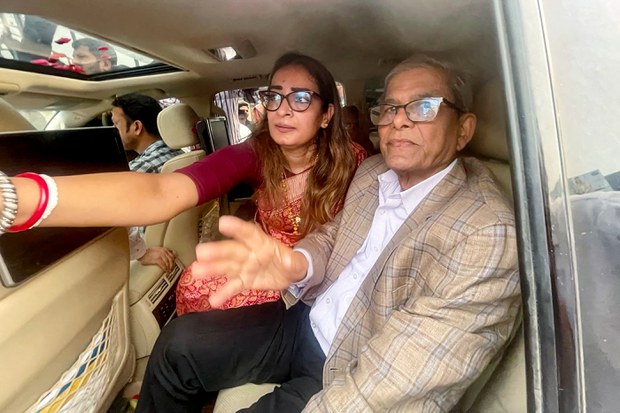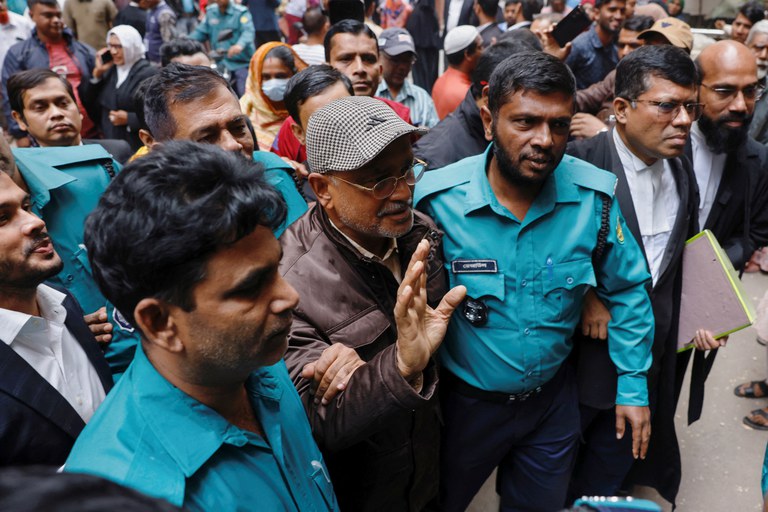With election over, Bangladesh opposition leaders trickle out of jail on bail
2024.02.22
Dhaka
 Bangladesh Nationalist Party Secretary General Mirza Fakhrul Islam Alamgir (right) looks on after his release from the Dhaka Central Jail in Keraniganj, Feb. 15, 2024.
Bangladesh Nationalist Party Secretary General Mirza Fakhrul Islam Alamgir (right) looks on after his release from the Dhaka Central Jail in Keraniganj, Feb. 15, 2024.
Ten senior leaders of Bangladesh’s main opposition party have been freed from detention in recent days but hundreds of party activists remain incarcerated more than seven weeks after the country’s ruling party won reelection in no-contest polls.
In the run-up to the Jan. 7 vote, the Awami League government of Prime Minister Sheikh Hasina rounded up and jailed thousands of members of the Bangladesh Nationalist Party over allegations that the BNP was fomenting violence and unrest.
For months, the BNP and its supporters were agitating in the streets for a free and fair election to be overseen by a neutral caretaker administration. Hasina’s government, which clinched a record fourth consecutive term in the polls boycotted by the BNP, had refused to give in to that demand.
On Thursday, a Dhaka court granted bail to Altaf Hossain Chowdhury, a former home minister under a past BNP government. He was arrested before the general election over his alleged involvement in an arson attack targeting the chief justice’s residence on Oct. 28, 2023.
The Awami League had “used the state apparatus against the BNP to hold the 12th general elections in a one-sided way,” Kayser Kamal, the BNP’s law affairs secretary, told BenarNews.
“Between mid-October and mid-January, nearly 27,000 BNP leaders and activists of different levels, including our Secretary General Mirza Fakhrul Islam Alamgir, were arbitrarily arrested across the country,” he said.
“The whole purpose of the massive country-wide combing arrest was to hold the elections in a one-sided way. They did it, and now our leaders are getting bail,” Kamal said.
The BNP is the only source that gives such a high figure for the number of party activists who were rounded up. Days after the polls were held, Human Rights Watch put the number of BNP leaders and supporters arrested before the election at more than 8,000.
BNP members staged a mammoth rally in front of the party office in Dhaka’s Nayapaltan district on Oct. 28. At one stage, opposition activists were locked in clashes with police, leading to the death of an off-duty officer.
In addition, protesters set fire to the gate at the chief justice’s home. BNP activists and leaders were arrested in connection with an arson attack on a train in Dhaka during which four people died in December. The train fire took place during a nationwide transportation strike called by the BNP in which activists also allegedly set buses ablaze.
Bail
Among the BNP leaders who were released from custody, Mirza Fakhrul Islam Alamgir and standing committee member Amir Khasru Mahmud Chowdhury were freed on Feb. 15.
More recently, Mirza Abbas, another member of the committee, was released on Monday after being locked up for 3½ months. BNP Joint Secretary General Syed Moazzem Hossain Alal, was released on Wednesday.
“Almost every day, our leaders and activists have been getting bail. Still more than 1,000 leaders and activists have been behind bars and facing harassment,” Kamal said. “This substantiates our position that the Awami League has used the law enforcers and other state apparatus against the BNP to come to power.
“Hundreds of our leaders and activists have been facing harassment in the court and jail, but we will continue our struggle to restore the democratic system in Bangladesh,” he said.

Awami League officials challenged the BNP allegations.
“Have they not carried out arson attacks on the house of the chief justice? They were arrested for the criminal offenses they carried out in the pretext of a democratic movement,” Law Minister Anisul Huq told BenarNews. “The judiciary is independent in giving bail.
“We are in dual trouble – if they are arrested, then they say we ordered their arrest and if they get bail, then they say the government is giving bail. What should we do?” he said.
Home Minister Asaduzzaman Khan Kamal said BNP members were responsible for their actions.
“They can carry out peaceful political programs. The government in no way would obstruct them. But if they resort to any sorts of violence, they must face legal actions,” he told BenarNews.
A political analyst, meanwhile, said there was some truth to BNP’s allegations.
“This is clear that the Awami League has used the state institutions against the BNP,” Nizam Uddin Ahmed, a political commentator and professor of political science at Chittagong University, told BenarNews.
“Before the elections, most of the leaders and activists were imprisoned,” he said, adding the BNP could not put pressure on the ruling Awami League in the final weeks leading up to the election.
“Now, the Awami League has no pressure from the international community. All countries have been working with the government,” he said. “The release of the BNP leaders would save them from the allegation that the ruling party has put the opposition behind bars.”







